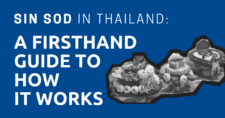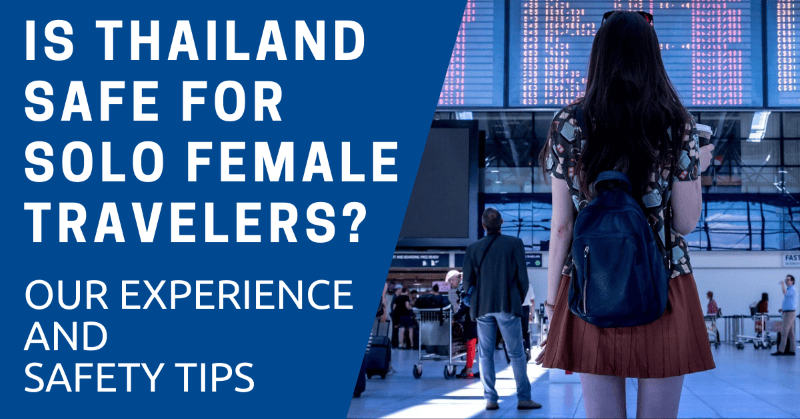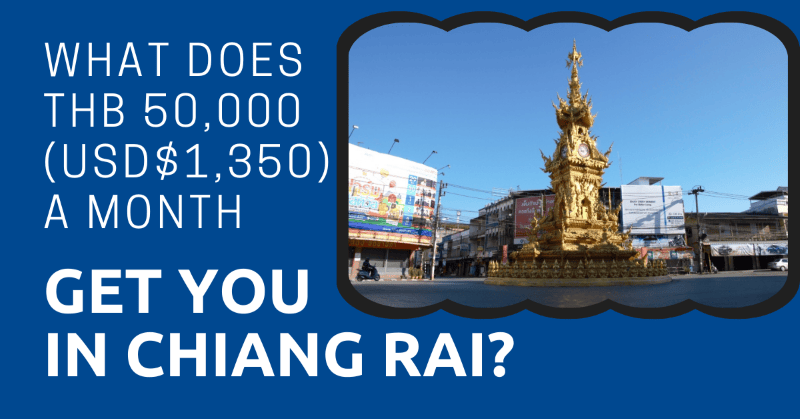
Discover the lifestyle and cost of living in Chiang Rai, with a monthly budget of THB50,000 covering accommodation, food, transportation, and activities.
When it comes to the popular northern provinces of Thailand, many might immediately think of Chiang Mai, right? But recently, it seems some people are getting a bit bored of Chiang Mai. The city is getting more developed daily, there’s more traffic congestion in many areas, and life feels increasingly hectic. So today, I want to introduce another province that is quite similar to Chiang Mai but much more peaceful—Chiang Rai.
Chiang Rai is a peaceful province rich in culture and surrounded by beautiful nature. At the same time, it offers a convenient lifestyle with a not-so-high cost of living. Chiang Rai is considered an incredibly livable choice. This article will delve into every aspect of living in Chiang Rai to give those interested a clear and complete picture before deciding to settle here.
"*" indicates required fields
Disclaimer: This article may include links to products or services offered by ExpatDen's partners, which give us commissions when you click on them. Although this may influence how they appear in the text, we only recommend solutions that we would use in your situation. Read more in our Advertising Disclosure.
Contents
(And How It’s Costing Them)
Most expats throw money away, get lost in red tape, and miss the local hacks that make life easier and cheaper. ExpatDen Premium gives you the secrets seasoned expats use to save, earn, and thrive beyond the basics, saving you thousands and opening doors you didn’t even know existed.
Here’s what’s inside:
- Housing Hacks: Slash your rent by 40% or more - because the locals are laughing at what you’re paying.
- Banking Mastery: Stop wasting on fees and get top exchange rates. Why give your money away?
- Healthcare for Local Prices: Quality treatment without the expat price tag.
- Visa and Legal Shortcuts: No more bureaucratic nightmares. Get the visa and residency secrets that others pay their lawyer dearly for.
- Deep Discounts: Find the savings locals rely on for groceries, dining, and more.
If you’re serious about making Thailand work for you, join ExpatDen Premium and make Thailand work for you.
About Chiang Rai
Chiang Rai is a province located in the northernmost part of Thailand, bordering Myanmar and Laos, which gives it the well-known nickname “The Land of Three Borders.” Originally founded as the capital of the Lanna Kingdom by King Mangrai in 1805 AD, Chiang Rai is rich in unique Lanna history and culture.
Chiang Rai is a city with stunning landscapes featuring a mix of mountains and the Kok River flowing through its heart, offering beautiful views and fresh air (as long as there’s no smog). The culture here is unique and vibrant, evident in its stunning temples like Wat Rong Khun, Rong Suea Ten Temple, and the Baandam Museum, which showcases the unique art of a local artist.
Besides, life here is simple, peaceful, and warm with friendly locals. There are plenty of local foods and outdoor activities. When it comes to drinks, the tea and coffee here are famous for their high-quality Arabica coffee and organic tea. There are tea and coffee plantations open for visits, where you can also buy some as souvenirs. I myself order tea and coffee from Chiang Rai to enjoy. The atmosphere in Chiang Rai is tranquil, unlike Chiang Mai or Bangkok, perfect for those looking to escape the chaos and experience the true Thai way of life.
Quality of Life
When it comes to quality of life in Chiang Rai, it’s perfect for those who love peace and nature, but still offers a decent level of convenience. The city is not as busy as Chiang Mai. Traffic flows smoothly, making life feel much more relaxed.
Living in Chiang Rai, you’ll meet kind-hearted and friendly locals. The area is peaceful and safe, with people living simple, unhurried lives, giving a warm feel. Surrounded by beautiful nature, from mountains and rivers to tea plantations, it’s ideal for adventurers or those wanting to re;lax in nature.
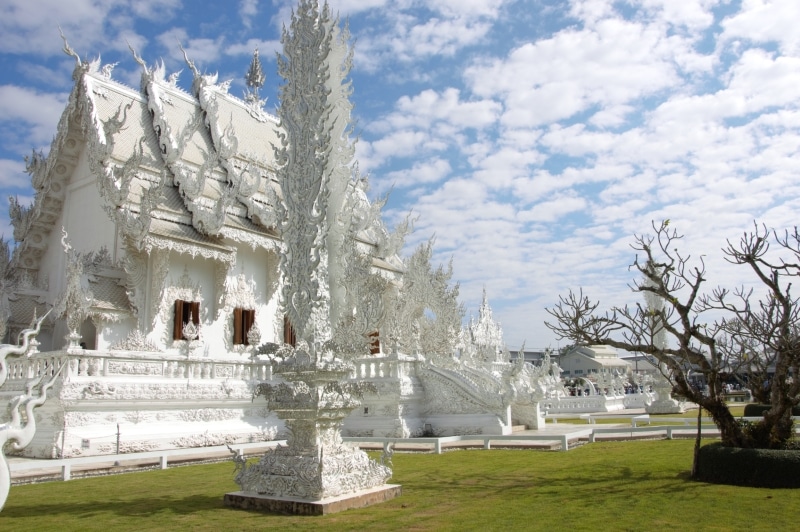
Plus, the cost of living isn’t high, making your money go further. Food, rent, and transportation are cheaper than in many major cities, allowing you to live comfortably without worrying much about money.
Chiang Rai is rich in Lanna culture, with unique traditions, art, and architecture that give a truly authentic Lanna Thai atmosphere, which is hard to find elsewhere.
The weather is mostly nice with a cool breeze year-round, but don’t forget that from February to April is the smoky season, so watch out for dust. One limitation is that big-city amenities are still limited, lacking international restaurants, luxury spots, or big malls like in Bangkok or Chiang Mai. English isn’t widely spoken, so if your Thai isn’t strong, you might face some challenges. But if you want to live like a local in a small town, Chiang Rai is a great choice.
Cost of Living
One of the main reasons many people choose Chiang Rai is the very affordable cost of living compared to other cities in Thailand, especially Bangkok. Overall, living costs in Chiang Rai can be 30-50% lower than in Bangkok, depending on your lifestyle.
Here’s an estimated average monthly cost for a person living alone in Chiang Rai.
- Rent: THB5,000 – THB15,000 (depends on type and location, may be higher for a large house)
- Food: THB5,000 – THB12,000 (mostly local food with some Western)
- Transportation: THB1,000 – THB3,000 (rent a motorbike, use Grab, or if buying a car, it might increase to THB5,000 monthly)
- Utilities (electricity, water, internet): THB1,500 – THB3,000
- Health insurance: THB1,000 – THB3,000 (for a basic plan)
- Entertainment and activities: THB3,000 – THB8,000 (includes café visits, massages, and workouts)
- Estimated total monthly expenses: THB20,000-THB45,000++
These numbers are just estimates, and the cost of living mainly depends on your lifestyle. Many people can manage with a cost of living below THB20,000 because it’s quite affordable. But if I were to recommend, you should have at least THB25,000 per month to spend more comfortably each month.
Rent
Overall, rent in Chiang Rai is quite affordable and offers a variety of options. You can choose based on your preferences and budget, from modern condos to traditional Lanna-style houses or studio apartments.
Condo/Studio Apartment or 1-Bedroom
In town or near facilities condo around THB6,000 – THB10,000 per month, partially furnished. Some places offer a pool or fitness center. If slightly out of town or older properties, it’s about THB3,500-6,000 per month for apartments.
Townhouses / Small detached houses
Housing estates in-town around THB8,000-THB15,000 per month, usually with 2-3 bedrooms, partially furnished. Out of town or local-style houses, around THB6,000-12,000 per month. Some have gardens offering more space.
Large standalone houses or resort-style villas
Prices starting THB15,000-THB30,000+ per month, suitable for families or those wanting lots of space with a garden and full amenities.
Food
When it comes to food in Chiang Rai, it’s something you absolutely shouldn’t miss. Living here means you have a variety of delicious options to choose from, whether it’s local Thai cuisine or international dishes, all easily accessible in terms of price.
Local Food
The local food in Chiang Rai has a flavor that’s mild and suitable for expats. If you’re into authentic local dishes, Chiang Rai is perfect for street food lovers and has countless small eateries. For example, Khao Soi features a rich and aromatic curry broth with spices, coconut milk, chili, mixed with noodles and tender chicken. Another recommended dish is Hang Lay curry with pork, known for its intense flavor and rich curry paste. Nam Prik Noom with Sai Ua sausage is a spicy Northern dish with a fragrant herbal aroma (though it might be too spicy for some).
Additionally, you can easily find general Thai food at reasonable prices starting from THB40-THB70, making it quite affordable.
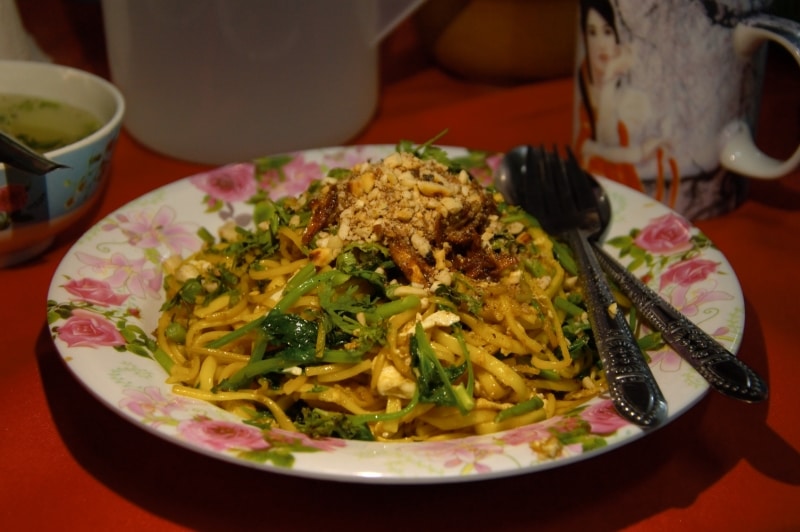
International Restaurants
Chiang Rai might not be as large as Chiang Mai or Bangkok, but it does have international restaurants featuring cuisines like Italian, American, Japanese, or Mexican. The prices are slightly higher, with most international eats found in the downtown area. Expect to pay around THB150-400 per dish.
Cafes
This is my personal favorite. Chiang Rai has a lot of charming cafes and bakeries, making it a hotspot for coffee and tea lovers due to its renowned coffee beans and tea plantations. Many cafes offer great-tasting brews with bonus scenic views, perfect for those seeking a quiet spot to sip coffee, work, or relax. A cup of coffee costs about THB60-120, striking a good balance without being too pricey.
Supermarkets
When it comes to buying groceries or drinks, there are big supermarkets like Big C, Lotus’s, Makro or Top’s Market around. There are also convenience stores like 7-Eleven or Family Mart in various locations, where you can find everything you need. Makro is especially great if you want to buy in bulk.
Moreover, if you’re searching for imported goods or ingredients, you can head to Top’s Central Chiangrai, which offers various imported ingredients from Europe, America, and Asia. Or, if you’re looking for Japanese cooking ingredients, you can find them at Kobe-Ya Chiang Rai.
Of course, there might not be as many things as in larger provinces, but it’s quite sufficient.
Overall, the food scene in Chiang Rai is quite convenient. It’s easy to find both local and international cuisine to enjoy delicious meals without breaking the bank. Rest assured, this place will definitely meet your needs.
Getting Around
Traveling around Chiang Rai is fairly convenient if you’re in the city center. However, once you venture outside the city, you’ll need private transport. The upside is the roads here are simpler than in big cities.
Motorcycles
If you’re planning to live in Chiang Rai, motorcycles are the most popular means of transport as they’re flexible and maintenance is very cheap. You can rent one for around THB2,500-THB4,000 per month, including maintenance costs, or if you prefer to own one, second-hand motorcycles start at THB30,000-THB50,000. Having a motorcycle makes it super convenient to get around.
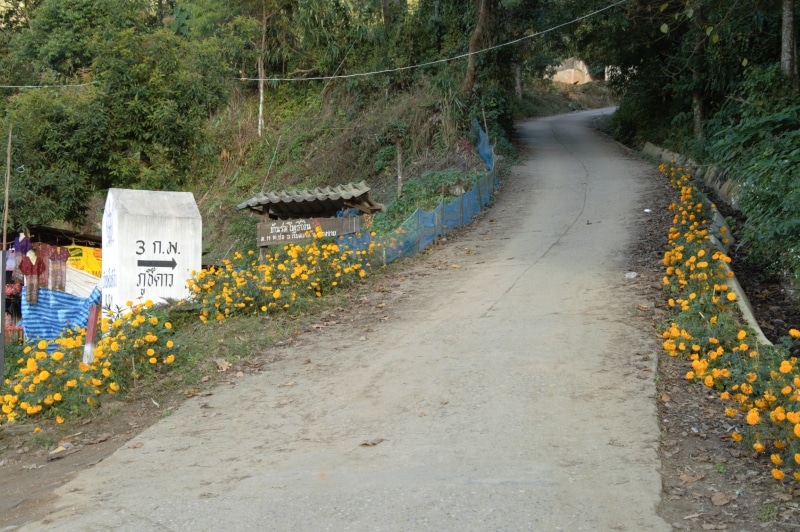
Take Note: While Chiang Rai’s traffic isn’t as heavy as in big cities, safety comes first. Always remember to wear a helmet and ride carefully. Riding a motorcycle in Chiang Rai can be easy if you have prior experience because the roads are less crowded and provide a smoother ride. Just be cautious and follow the steps to get a driving license. If you plan to venture outside the city, make sure to study the routes, especially in hilly areas where road conditions can be unpredictable, posing risks, especially during rain or on curves.
Ride-Hailing Apps
If you don’t want to drive yourself or just need short-distance travel in the city, Grab or Bolt are the most convenient options. You can call either a car or a motorcycle taxi, the prices are reasonable, the service is fast, and it’s easy to use.
Taxis
Taxi services are available too, but not as widely as Grab. Sometimes you might need to call one through a hotel or wait at designated stops. In Chiang Rai, if you’re taking a taxi out of the city, it’s advisable to agree on the fare beforehand since many taxis don’t use meters to avoid overly expensive charges.
Songthaews
Chiang Rai does have some songthaews passing through, but not extensively and they don’t cover the entire province. It might be a bit tricky to catch one if you’re not a local.
Private Cars
If you’re planning to move to Chiang Rai and have some budget to spare, having your own car is ideal. This way, you can drive anywhere without wasting time waiting for transportation. Used cars start from THB300,000—determine if you’re ready to invest for long-term convenience.
Walking/Cycling
Walking is suitable only in the city center, perfect for those who enjoy strolling or want some exercise. It feels particularly refreshing in cooler weather. As for cycling, Chiang Rai is popular among cyclists, but if you’re planning a long ride, be cautious of cars and try to avoid night rides since vehicles outside the city tend to drive fast, making it dangerous for cyclists.
Long Distance Travel
If you want to travel to other provinces, it’s quite easy. Chiang Rai has a convenient airport close to the city, Mae Fah Luang – Chiang Rai International Airport (CEI), which offers direct flights to Bangkok and other provinces like Phuket and Hat Yai easily.
There are also local buses or coaches with a bus station that can take you to various provinces across the country.
Healthcare and Fitness
Chiang Rai has a good healthcare system with a full range of self-care options, from fitness centers, pharmacies, clinics, to hospitals.
Hospitals
Chiangrai Prachanukroh Hospital is a large government hospital in the province. It offers comprehensive services and has a big team of doctors. However, there might be challenges regarding treatment and language barriers, not to mention the long waiting times, as it’s a go-to spot for locals.
If you’re looking for quicker and more convenient service, private hospitals like Kasemrad Sriburin Hospital and Overbrook Hospital are great choices because they have medical teams who speak English well. The costs might be higher than in public hospitals, but you get speed and comfort in return, and the treatment quality is quite good. If there’s a severe illness or major surgery required, it’s best to travel to Chiang Mai or Bangkok. There, you’ll find more specialized medical teams. And if possible, get health insurance too.
In Chiang Rai city, there are also many specialized and general clinics, such as dental clinics and general disease clinics, making it easy to find initial medical consultation or minor treatments. There are also plenty of drugstores, so buying medicine is very convenient indeed.
Exercise
Chiang Rai has plenty of exercise options, from small hotel gyms to full-scale fitness centers such as The Exclusive Fitness at Chiang Rai Mall, which is well-equipped and offers yoga, Zumba, and body combat classes. Monthly membership is around THB1,800, and personal trainer services are also available. The city also has public parks like Tung and Khom Park, perfect for walking, running, and cycling in a relaxed outdoor setting. In addition, there are several yoga and Pilates studios, and outdoor activities such as hiking, mountain biking, or learning Muay Thai are also easy to find. Overall, Chiang Rai caters to every lifestyle for health and fitness enthusiasts.
Social Life
Chiang Rai might not be as bustling as Bangkok or Chiang Mai, but it has its own charm. It’s perfect for those who enjoy peace and are looking for deep friendships. The expat community here is smaller but quite close-knit and supportive. There are several Facebook groups for sharing information and organizing regular meet-ups.
There are social activities like parties, group events, or get-togethers at cafes and bars, great chances to meet new friends. Many cafes and restaurants are popular hangouts for both Thai and expats, making them excellent spots to build connections.
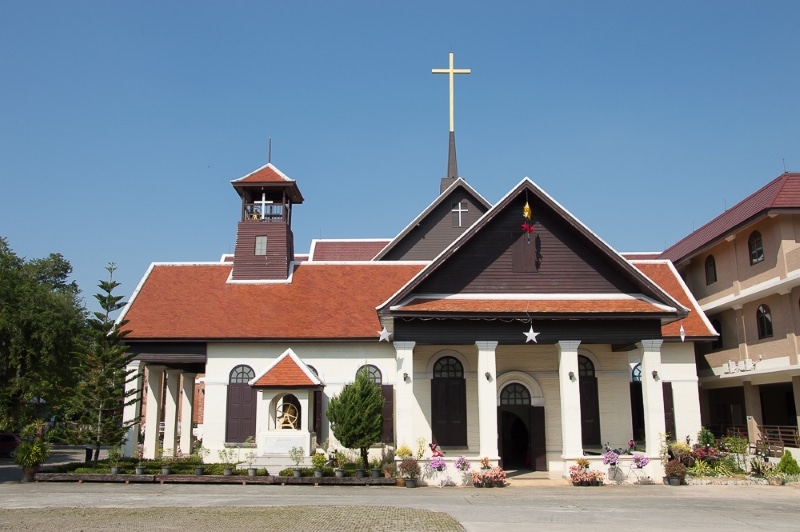
If you want to meet new people, try joining a Thai language class, cooking class, yoga, or an art workshop, where you’ll find others with similar interests. Volunteering is another great way; you not only help the community but also make new friends who are just as kind-hearted. Learning Thai can help too, enabling you to connect more with locals and understand the culture better.
Outdoor activities like hiking, biking, or exploring the town are great chances to build friendships. It might take some time at first, but once you start networking, you’ll feel that Chiang Rai is a really warm and friendly community.
Activities
Chiang Rai offers a wide range of activities. Whether you’re interested in culture, nature, or just want to relax, there are plenty of places to enjoy.
Temples and Cultural Art
Chiang Rai is full of iconic cultural spots. The White Temple (Wat Rong Khun), a world-famous masterpiece by artist Chalermchai Kositpipat, beautifully blends contemporary art with Buddhist symbolism. The Blue Temple (Wat Rong Suea Ten), designed by one of Chalermchai’s students, stands out with its striking mix of bright blue and gold, making it both spiritual and visually stunning.
Then there’s Baan Dam (Black House), the home and museum of Thawan Duchanee, showcasing mysterious and unique works of national art. Don’t miss Wat Phra Kaew either, an important historic temple that once housed the Emerald Buddha. Each place has its own story and beauty, and if you visit, you’ll definitely be impressed.
Nature Tourism
Chiang Rai is full of natural attractions, especially tea plantations like Choui Fong Tea Plantation, a large and famous tea plantation in Chiang Rai. Located in Mae Chan district, the plantation offers stunning views of tea fields arranged in terraces on the mountainside. It’s an ideal spot for photography and enjoying high-quality tea straight from the source. There is also a café serving drinks and various treats made from fresh green tea, providing a relaxing atmosphere amidst nature. Plus, there are restaurants and beautiful viewpoints. If you visit Chiang Rai and don’t drop by here, you haven’t truly arrived!
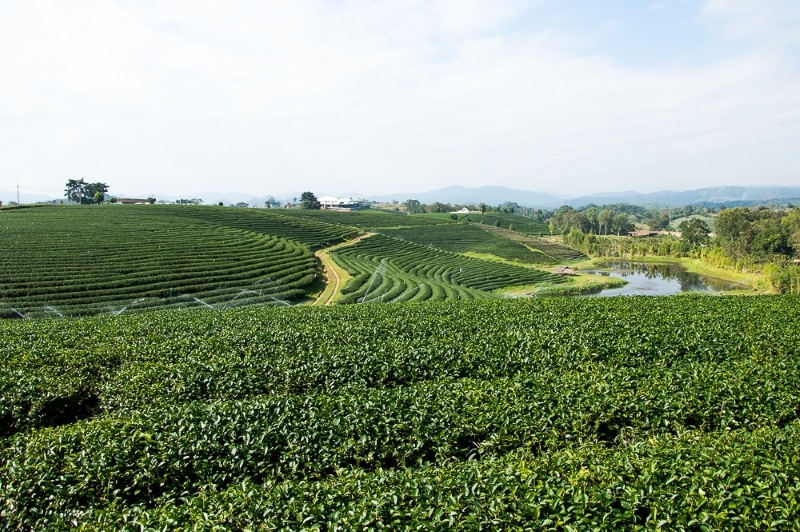
Also, there’s Phu Chi Fa, where you can enjoy breathtaking sea fog views and stunning sunrises. There are several waterfalls to visit, like Khun Korn Waterfall andPhu Kaeng Waterfall. There’s also the Kok River where you can take a boat ride and enjoy the scenic riverbanks. If you’re into hill adventures, there’s always Doi Mae Salong to experience Yunnan Chinese culture, sip some tea, and take in the mountain views.
Markets and Shopping Spots
When it comes to markets and shopping, Chiang Rai has a real cultural vibe. The Chiang Rai Walking Street happens every Saturday from 4 p.m. to 11 p.m. and stretches almost 1.5 kilometers through the city center. It’s packed with tasty street food, local snacks, handmade crafts, and souvenirs, plus live traditional music that gives it a cozy, laid-back feel, perfect for strolling, snacking, and picking up a few keepsakes.
The Chiang Rai Night Bazaar is open every day and has a similar mix of food, souvenirs, and live music. For fresh local ingredients, Luang Market (Municipal Market 1) is the go-to spot, right in the heart of town.
Other Activities
If you’re staying in Chiang Rai for a while and want to try cooking Thai food, there are fun Northern Thai cooking classes available. If you’re looking to relax, you’ll find plenty of top-notch Thai massage and spa services all around Chiang Rai.
Education and Family Life
If you’re planning to move to Chiang Rai with your family, it’s a mixed bag of pros and cons. The good thing is that it’s peaceful here with a lot of outdoor and nature activities. The community is also pretty good. However, Chiang Rai has relatively few school options compared to Bangkok, Hua Hin, or Chiang Mai, and the quality might not match other major provinces.
Education
In Chiang Rai, there’s the Chiang Rai International School (CRIS), the only international school in the area offering a curriculum based on international standards (British Curriculum) from kindergarten to high school.
Additionally, there are some schools that offer bilingual programs (Thai-English Program) as an alternative with lower expenses than international schools, such as Tondeesueksa School (AMEC school) which teaches in English 80% of the time and Thai 20%, from Kindergarten 1 to Grade 6, and also Pitisuksa School (Chiang Rai Montessori) which follows an English program from kindergarten to Grade 12.
Family Life
When it comes to safety and living conditions, Chiang Rai is quite a good city because the environment is safe and peaceful. The laid-back atmosphere helps kids live a relaxed life. Plus, there are tons of fun activities for kids, from parks and outdoor playgrounds to easy hiking trails and cycling routes suitable for all ages.
The cost of raising children in Chiang Rai is lower than in big cities, making family life more comfortable. Kids also have the chance to get close to nature, learning about plants, animals, and the rural lifestyle in earnest. Although the expat community isn’t large, there are groups of expat families in Chiang Rai who share experiences and lend a warm helping hand to each other. Moving to Chiang Rai with your family won’t be lonely at all.
Job Opportunities
To be honest, for most expats considering a move to Chiang Rai, job opportunities are quite limited. The easiest job to find is an English teaching position because many schools are looking for foreign teachers. You could also work as a special English tutor. However, the earnings might not compare to other provinces.
Aside from teaching, job opportunities for expats are very limited.
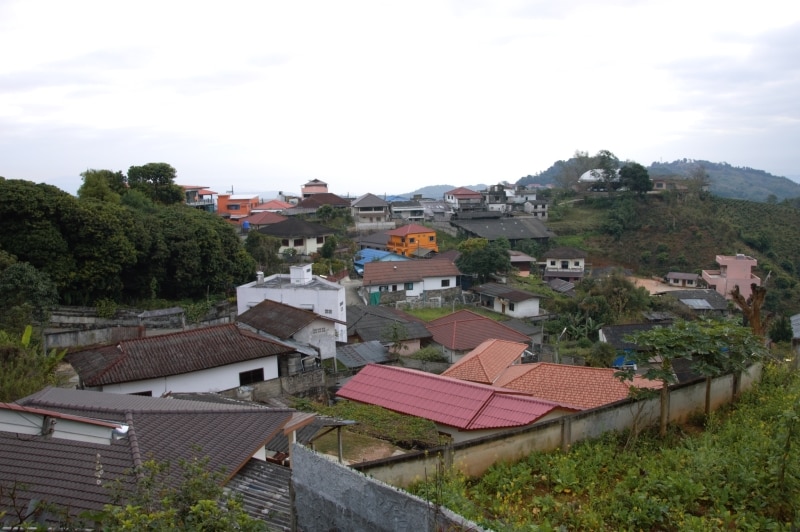
Nightlife
Nightlife in Chiang Rai is not overly abundant. Most of it is concentrated in the town center and it’s quieter and more relaxing than other places. It’s not about heavy partying, but a chill vibe where you can hang out comfortably. For instance, the Chiang Rai Night Bazaar is a nighttime hotspot. It features a variety of eateries, from street food to cozy spots, souvenir shops, and a live music stage with cultural performances for a great mood.
Here you’ll find small bars and pubs, with many live music bars playing rock, pop, or folk songs—perfect for chilling with friends. There’s also a bar scene for expats where you can easily meet new friends. Plus, there are plenty of restaurants and cafes open till late, whether you’re looking to grab dinner, take a coffee break, read a book, or just hang out.
Expat Community
The expat community here is smaller than in Bangkok or Chiang Mai, but it has its own charm and a very warm and friendly vibe. The community is diverse, with retirees, language teachers, and digital nomads.
With its small size, people here find it easy to get close and know each other. If someone has a problem, they’re always ready to help. Most expats gather on Facebook or various apps to organize meet-ups, hang out at bars and cafes, or join different activities. There are also small clubs based on interests like cycling, hiking, or yoga to meet new friends who enjoy similar things.
Weather and Air Quality
Chiang Rai has three main seasons, just like the rest of northern Thailand, so the weather is relatively nice and cool compared to other provinces in Thailand. However, during the hot season (March – May), it can get quite hot with temperatures around 30-40°C. The other seasons are generally cool and pleasant, with temperatures around 25-28°C.
The winter season (Nov – Feb) boasts the best weather, with temperatures sometimes dropping to 10 degrees, especially if you’re staying up in the mountains. Occasionally, the temperature can even hit single digits.
However, Chiang Rai, much like Chiang Mai (and other provinces in the North), faces the “smog problem” during the smog season (Jan – Apr). Especially from late Feb to early Apr, the air quality worsens due to agricultural burning, forest fires, and smog from neighboring countries. On some days, the air quality index (AQI) is dangerously high, impacting health and visibility for traffic.
Overall, the air quality is excellent during other times of the year. Rain helps to reduce dust, making the atmosphere quite pleasant for living. If you have respiratory issues or are sensitive to air quality, it’s a good idea to have an air purifier at hand.
Flooding
Overall, Chiang Rai has been experiencing floods quite frequently lately. For instance, in 2024, there was a major flood affecting nearly the entire province. Risky areas include those near the Kok River or lowland areas that may experience overflow during heavy rains. Regions at the foot of hills or near small streams can face flash floods if it rains continuously for days. In severe cases, the main city and remote districts can be unexpectedly inundated during heavy downpours
So, before renting a place, check its history or ask locals to find out if it has been flooded before.
Popular Areas
Chiang Rai has many neighborhoods to choose from, each with its own unique features and benefits. Pick one that matches your lifestyle. Ultimately, it comes down to your lifestyle preference and budget. It’s best to explore each area before making a choice.
City Center/ Around Wiang
If you want to experience life in Chiang Rai, I’d recommend starting in the city itself. It’s the easiest and most vibrant place to live, with all the conveniences you might need, including the main hospital. The most bustling area is near the clock tower, night bazaar, and walking street.
Most accommodations are condos and studio or 1-bedroom apartments, making it super convenient with lots of restaurants, cafes, and fresh markets nearby. It’s also close to Central Plaza Chiang Rai. The downside might be the noise, and it can be a bit tricky to find parking. It’s ideal for those who like convenience and can get around on foot without needing a car.
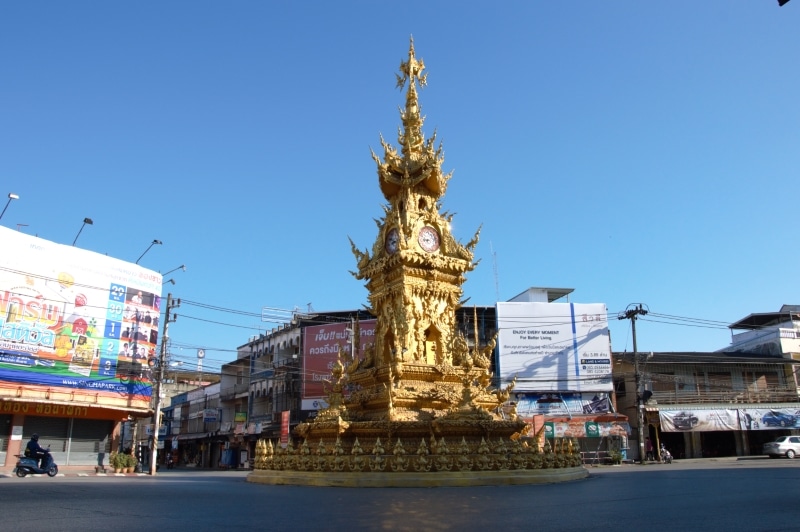
San Sai/ Just outside the city center (like around Si Sai Mun intersection)
If you’re looking for a quieter place to live, try the areas around the city like San Sai District. You’ll find new neighborhoods and condos, detached houses, and townhouses with swimming pools and fitness centers nearby. It’s close to major malls like Big C and Makro, as well as international schools.
But you’ll need a personal car since it’s not as convenient to get around as in the city. It’s ideal for families or those who prefer spacious and tranquil areas.
Mae Fah Luang University Area
This area is perfect for those wanting to live frugally but still have some conveniences at hand. It’s about 15-20 km from the city center, but the atmosphere is fresh with lots of students around. You’ll find affordable housing options like dormitories and small apartments, cheap food, and a close proximity to nature. The downside is the distance from the city, which requires a lot of driving. It’s ideal for those who don’t need to go into town often or have kids studying at Mae Fah Luang University.
Rural/Outskirts Areas (Mae Suai, Wiang Pa Pao, Mae Chan)
Perfect for those wanting to escape the hustle and bustle, focusing on nature and slowing down life. Large standalone resort-style homes with lots of gardens, reasonably priced. The air is exceptionally fresh, but you’ll need a car to get around. Public services in the city might be hard to access. Ideal for retirees or anyone seeking a peaceful atmosphere, wanting to farm or have plenty of space for gardening.
Living on a budget of THB50,000 per month
Assessing the cost of living, a budget of THB50,000 per month allows you to live comfortably with quality, and have some left over for savings or leisure activities.
- Rent is around THB10,000-THB15,000 for a nice one-bedroom condo with a pool and gym, or a townhouse in a quiet neighborhood. Could be more if it’s a big house with many rooms.
- Utilities THB2,000-THB3,500, including electricity, water, high-speed internet, and mobile package.
- Food THB10,000-THB15,000, enjoying delicious Thai meals once a day, mixed with some international cuisine at nice places, and cooking yourself on some days.
- Transportation THB2,000-THB4,000 for car fuel or Grab rides in and around the city.
- Health Insurance is about THB2,000-THB4,000, giving you peace of mind for medical expenses.
- Entertainment and Activities THB5,000-THB10,000 for fitness, yoga classes, Thai massages, cafe hopping, live music bars, or trips out of town, and various workshops.
- Savings or Personal Expenses Around THB1,500-17,000, while also saving for emergencies or future travels.
In summary, a monthly budget of THB50,000 in Chiang Rai allows you to have a nice home, enjoy tasty food, live comfortably, relax, and indulge in various activities.
Should You Live in Chiang Rai?
If you enjoy a peaceful, relaxing lifestyle, Chiang Rai is the place for you. It’s full of beautiful nature, charming Lanna culture, and affordable living costs that make your money go further. Chiang Rai is also ideal for Digital Nomads, retirees, and those wanting to teach English, as jobs in these areas are most readily available.
If you love delicious, affordable food, a safe family-friendly atmosphere, and want to be close to nature with opportunities for outdoor activities, Chiang Rai might be perfect for you. However, if you’re looking for a lively nightlife, various job opportunities, or big city conveniences, Chiang Rai might not be the right fit.
Another thing to consider is the smoky haze in early months (Feb-Apr). The air can be troublesome for those with sensitivities or respiratory issues, so caution is advised. Also, if you don’t like riding motorcycles or don’t have personal transport, getting around Chiang Rai might be less convenient.
If you’re seriously thinking about moving here, an easy tip is to take a long vacation for 1-2 weeks or even a month first. Experience the real life in each season, especially winter and the smoky season, to find out if Chiang Rai is the home you’re looking for.
In summary, Chiang Rai is ideal for those looking for tranquility and joy with nature and culture at an affordable price. However, it might not suit those who thrive on vibrant city life or big cities. So, if you’re interested and enjoy living with culture and a super easygoing lifestyle, Chiang Rai is definitely the place for you.




